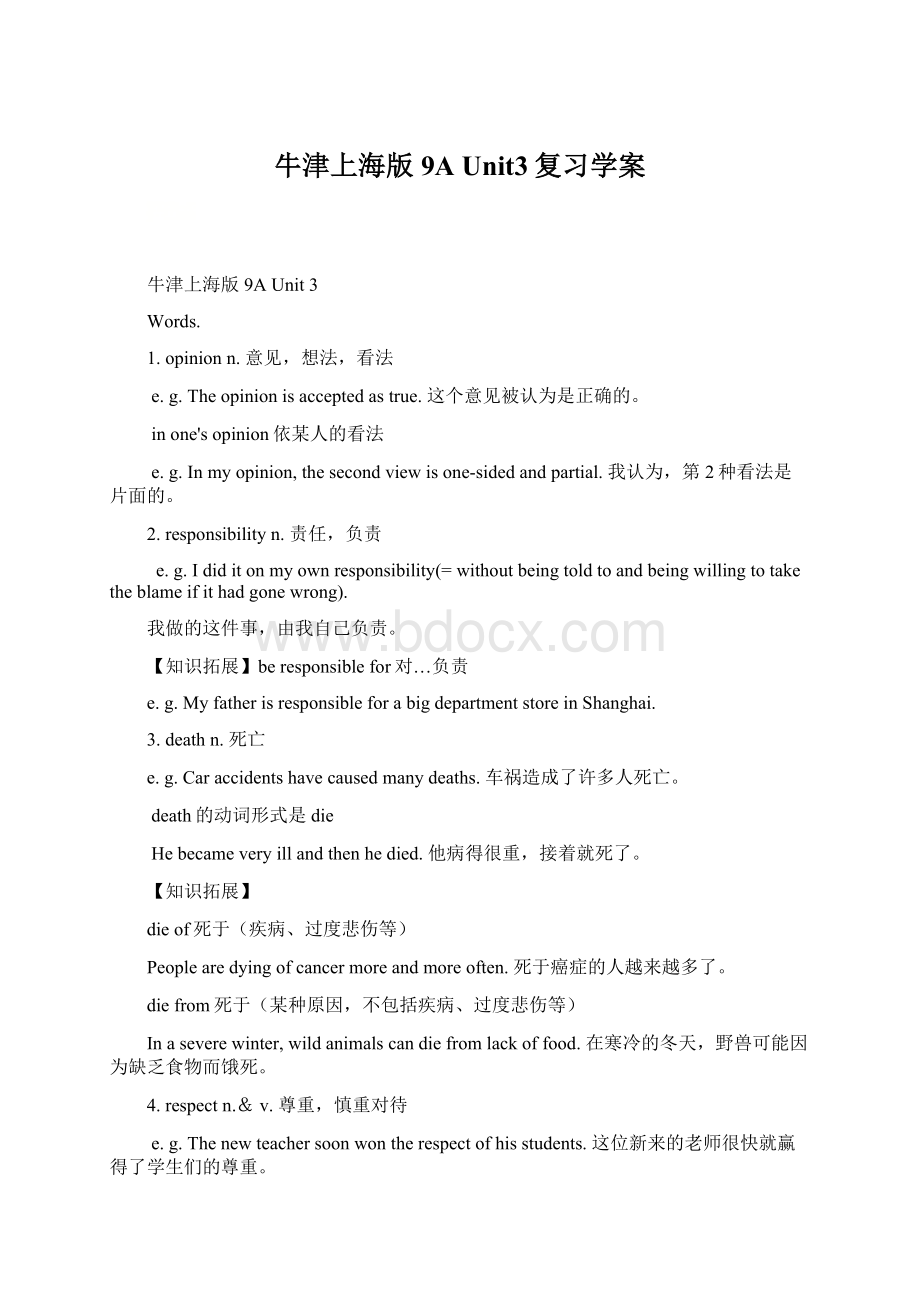牛津上海版9A Unit3复习学案.docx
《牛津上海版9A Unit3复习学案.docx》由会员分享,可在线阅读,更多相关《牛津上海版9A Unit3复习学案.docx(14页珍藏版)》请在冰豆网上搜索。

牛津上海版9AUnit3复习学案
牛津上海版9AUnit3
Words.
1.opinionn.意见,想法,看法
e.g.Theopinionisacceptedastrue.这个意见被认为是正确的。
inone'sopinion依某人的看法
e.g.Inmyopinion,thesecondviewisone-sidedandpartial.我认为,第2种看法是片面的。
2.responsibilityn.责任,负责
e.g.Ididitonmyownresponsibility(=withoutbeingtoldtoandbeingwillingtotaketheblameifithadgonewrong).
我做的这件事,由我自己负责。
【知识拓展】beresponsiblefor对…负责
e.g.MyfatherisresponsibleforabigdepartmentstoreinShanghai.
3.deathn.死亡
e.g.Caraccidentshavecausedmanydeaths.车祸造成了许多人死亡。
death的动词形式是die
Hebecameveryillandthenhedied.他病得很重,接着就死了。
【知识拓展】
dieof死于(疾病、过度悲伤等)
Peoplearedyingofcancermoreandmoreoften.死于癌症的人越来越多了。
diefrom死于(某种原因,不包括疾病、过度悲伤等)
Inaseverewinter,wildanimalscandiefromlackoffood.在寒冷的冬天,野兽可能因为缺乏食物而饿死。
4.respectn.&v.尊重,慎重对待
e.g.Thenewteachersoonwontherespectofhisstudents.这位新来的老师很快就赢得了学生们的尊重。
【知识拓展】respectableadj.值得尊敬的
5.faithfullyadv.忠实地,忠诚地
e.g.Healwaysperformshisdutiesfaithfully.他一贯忠实地履行自己的职责。
【知识拓展】faithn.信仰,信任
e.g.Faiththatjusticewouldprevailimpelledusforward.正义必胜的信念激励着我们前进。
faithfuladj.忠实的,守信的
e.g.Weareallfaithfulllistenerstotheprogram.我们都是这档节目的忠实听众。
6.mess
①肮脏,杂乱;不整洁
②(狗、猫等的)粪便
e.g.Theroomwasinamess.这个房间杂乱不堪。
7.resultn.后果;结果
e.g.Successdependsontheresultsofthisexperiment.成功与否取决于这次实验的效果。
8.bitev.咬
e.g.Barkingdogsseldombite.爱叫的狗不咬人。
9.extremelyadv.极其,非常
e.g.Shefounditextremelydifficulttogetajob.她发觉找工作极其困难。
10.unhappyadj.不快乐的,不幸福的;悲伤的
e.g.Forallthiswealth,hewasunhappy.尽管他富有,但他并不幸福。
【知识拓展】否定前缀un-加在名词,形容词,副词之前
如:
unfinished(未完成的)undoubted(无疑的),unhappy(不快乐的)
类似的否定前缀in-加在形容词,名词之前
如:
incorrect(不正确的),inability(无能,无力),inaccurate(不准确的)
im-加在字母m,b,p之前
如:
impossible(不可能的),impolite(不礼貌的)
日常表达
1.fromsidetoside从左到右
e.g.Theshiprolledfromsidetoside.船左右摇晃。
【知识拓展】sidebyside肩并肩地;一起
e.g.Thetwochildrenarewalkingsidebyside.那两个孩子肩并肩地走着。
2.growup成长;长大
e.g.Theirchildrenhaveallgrownupandlefthomenow.他们的孩子都已长大成人离开家了。
3.accordingto据(……所说)
e.g.AccordingtoMick,it'sagreatmovie.据米克说,这是一部了不起的电影。
You'vebeenabsentsixtimesaccordingtoourrecords.根据我们的记录,你已经缺席六次了。
4.carefor关爱
e.g.Youngpeopleshouldlearntocareforothers.年轻人应该学会关爱他人。
【知识拓展】takecareof照顾
e.gTheyappointedhertotakecareofthatoldman.他们委派她照顾那位老人。
careabout喜欢
e.g.Ireallycareaboutthestudentsinmyclass.我的确喜欢这个班上的学生。
5.asaresult因此;结果
e.g.Asaresult,hehadtoleave.结果他只得离开。
【知识拓展】
resultfrom起因于
e.g.Hisillnessresultedfrombadfood.他的病是由于吃了变质的食物所致。
resultin结果;导致是
e.g.Theirdisputeresultedinwar.他们的争端导致了战争。
6.stop…from阻止某事发生
e.g.Theguardstoppedhimfromgoingthroughthegate.警卫不让他通过大门。
【指点迷津】stoptodosth.与stopdoingsth.
stoptodosth.停止、中断(某件事),目的是去做另一件事
e.g.Theystoppedtoworkandhavearest.他们停下来工作并休息了一会儿。
stopdoingsth.停下正在做的事
Pleasestopspeaking.It’stimetobeginourclass.请肃静,上课时间到了。
7.what'smore而且
e.g.What'smore,mostpeopleinmoderncitiesliveinflats.而且大多数的人生活在大城市里的公寓里。
8.payfor为……付钱
e.g.Ihavetopay150dollarsforthesewingmachine.我得花150美元买这台缝纫机。
【指点迷津】spend,take,pay,cost
四者都可表示“花费”
(1)spend的主语通常是人,往往用于以下句型:
(sb)spendsomemoney/sometimeonsth.
(sb)spendsomemoney/sometime(in)doingsth.
e.g.Ispentfiftyyuanonthecoat.=Ispentfiftyyuan(in)buyingthecoat.我花50元买了这件大衣。
(2)take常用于“占用、花费”时间,其主话通常为形式主语“it"或物。
句式是:
Ittakes/tooksb.sometimetodosth=Sth.takessb.sometime.
e.g.Ittookmethreeyearstodrawthebeautifulhorses.画这些漂亮的马花费了我3年时间。
Theworkwilltakemetwodays.这项工作花了2天时间。
(3)pay为“付款,赔偿”之意,主语通常是人,往往是sb.payssomemoneyforsth或paysb.(somemoneyforsth)
e.g.Ipaidfiftyyuanforthecoat.我花50元买了这件大衣。
(4)cost的主语必须是某物。
动词cost的常用用法是sth.cost(sb.)somemoney。
e.g.Thedictionarycostme$20.这本字典花了我20美元。
【随堂小练】
Ⅰ.Fillintheblankswiththeproperformofthegivenwords
1.Whenweheardourteamwonthegame,allofuscheered(exciting).
2.Thedogbecomes(extreme)unhappy.
3.Ihaveanumberof(complain)aboutthehotelroomyou'vegivenus.
1.Myfavouriteshopis(locate)onthesecondfloorofatallbuilding.
2.TheGreatWallis(wide)knownallovertheworld.
3.It'smy(please)totalkwithyou.
【Keys】1.excitedly2.extremely3.complaints4.located5.widely6.pleasure
Ⅱ.Choosethewordorexpressiontoreplacetheunderlinedpartineachsentence
A.AssaidbyB.wentawayC.very
D.veryunpleasantE.comebackF.hasbecomedifferent
()1.ThistownhaschangedalotsinceIwasyoung.
()2.Wewereextremelybusybeforetheexamination.
()3.Ileaveon10Aprilandreturnon6June.
()4.Accordingtotheweatherreport,itisgoingtorainthisafternoon.
()5.Whataterriblethingtodo!
【Keys】1.F2.C3.E4.A5.D
ImportantSentencesstructures.
1.It'snicetopickthemupandholdtheminourarms,andit'swonderfultoseethemgrowingup.
句中的it是形式主语,后接两个不定式topickup,(to)hold是句子逻辑上的真正的主语。
e.g.It'snicetoknowthatsomebodyappreciateswhatIdo.知道有人欣赏我所做的事真让人开心。
【知识拓展】
it作形式主语主要用于下列两种情况
1)It+is/was+adj./n.(形容词或名词)+todosth.
e.g.Itisagoodideatothinkthisway.
Itisverykindofyoutogivemeahandintime.
2)It十v.+todosth.
e.g.Ittookusthreeyearstocompletetheproject.我们花费三年时间才完成了这项工程。
Itsoundsreasonabletodoitthisway.听起来这样做有道理。
2.Youngpeoplecanlearnhowtocareforothersandhowtorespectalllivingthingsbykeepingapetdog.
本句中疑问副词how和不定式tocareforothers及howtorespect…做整个句子的宾语。
how解释为“如何”。
e.g.Pleaseshowushowtodothat.请演示给我们如何去做。
TherearesomanykindsoftaperecordersonsalethatIcan'tmakeupmymindwhichtobuy.
有这么多的录音机,我都拿不定主意买哪一种。
【随堂练习】
I.Choosethebestanswer
()1.Hewasproudtohavebehavedso.
A.goodB.betterC.bestD.well
()2.Shewantstobeafamoussingerwhenshe.
A.grownupB.growingup
C.grewupD.growsup
()3.doestheAfricanGhostFishlooklike?
A.HowB.WhichC.WhatD.Who
()4.ThisJapanesespokequiteinthespeech.
A.politeB.politelyC.politenessD.impolite
()5.Thedogwaggeditstail.
A.excitingB.excitinglyC.excitedlyD.excited
()6.Ithinkisagoodideatodomorningexerciseseveryday.
A.itB.thatC.thisD.these
()7.Youneedtohurryup.Otherwiseallthecheapitemswillbe.
A.selloutB.soldoutC.selloverD.soldover
()8.Whowillthisbigproject?
A.asaresultB.beresponsiblefor
C.careforD.barkat
()9.Theworkintwomonths.
A.isfinishedB.wasfinished
C.willfinishedD.canbefinished
()10.Theboxistooformetocarryupstairs.
A.heavyB.fastC.heavilyD.fastly
()11.IfyougotoMacao,you'llseeaevensquare.
A.wideB.widelyC.widerD.verywide
()12.HeaskedmeIwasbusywiththosedays.
A.thatB.ifC.whyD.what
【Keys】1.D2.D3.C4.B5.C6.A7.B8.B9.D10.A11.C12.D
Ⅱ.Rewritethesentencesasrequired
1.Shetakespartinthesingingcontest.(改为否定句)
2.Thewaterwassodirtythatwecouldn'tdrinkit.(改为简单句)
3.Wemusttakegoodcareoftheoldpeople.(改为被动语态)
【Keys】
1.Shedoesn'ttakepartinthesingingcontest.
2.Thewaterwastoodirtyforustodrink.
3.Theoldpeoplemustbetakengoodcareofbyus.
Grammar.
一、含有情态动词的被动语态的构成:
情态动词+助动词be+及物动词的过去分词
e.g.Teenagersshouldbeallowedtogooutwiththeirfriends.应该允许青少年和朋友外出。
注意:
在情态动词后面加not就变成了否定句,把情态动词提前到句首,就变成了一般疑问句。
e.g.ItcannotbedonebyJim.这件事不可能是吉姆干的。
Mustthetreeswaterednow?
这些树必须浇水吗?
二、副词(adverb,缩写式为adv.)修饰动词、形容词、名词、其他副词或全句。
(一)副词的分类
1.一般副词可分为以下四种:
时间副词如:
often,always,usually,early,now
地点副词如:
here,there,above,below,outside
方式副词如:
hard,well,badly,fast,slowly
程度副词如:
very,quite,much,still,almost
2.疑问副词
how,when,where,why(放在特殊疑问句句首)
3.关系副词
when,where,why(放在被引导的从句句首)
4.连接副词
how,when,where,why,whether(放在名词性从句句首).
(二)副词的位置
1.时间副词和地点副词的位置
(1)表示确定的时间和地点的副词一般放在句尾。
若句中同时出现地点副词和时间副词,地点副词通常放在前面。
e.g.HewillleaveforBeijingtomorrow.他明天将要去北京。
(2)表示不确定时间的副词,如always,usually,often,never,ever,seldom,sometimes,rarely,generally,frequently等,通常放在行为动词之前,但放在be动词、助动词、情态动词之后。
e.g.We’llneverforgetyourkindness.我们永远忘不了你的好。
Sheisalwaysthefirsttocome.她总是第一个来。
Youcanoftenaskmequestionsifyouneed.如果你需要,你可以经常找我问问题。
2.修饰形容词和副词的程度副词,除enough外,一般放在被修饰词之前。
e.g.Heswimsquitewell.他游泳游得很好。
Sheswimswellenough.她游泳游得相当好。
3.修饰动词的方式副词有以下几种情况:
(1)修饰不及物动词的方式副词要放在被修饰词之后。
e.g.Thebabyissleepingsoundly.这孩子睡得很香。
(2)修饰及物动词的方式副词可放在被修饰词之前或宾语之后,若宾语较长,也可以放在动词和宾语之间。
e.g.SheseldomspeaksFrench.她很少说法语。
ShespeaksFrenchfluently.她法语讲得很流利。
Allthemorningshehasbeenwritingcarefullyalettertoherboyfriend.
她今天一上午都在认真地给她的男朋友写信。
(3)及物动词和副词(如:
down,on,off,in,out,up等)组成的动词词组有名词作宾语时,该名词可以放在副词之后或副词之前;若有代词作宾语时,则该代词一定要放在副词之前。
e.g.Hecutdownthetree.(=Hecutthetreedown.)他把那棵树砍倒了。
Hecutitdown.他把它砍倒了。
(代词作宾语时不可以说:
Hecutdownit.)
(4)修饰名词的副词放在被修饰词之后。
e.g.Thepeopleherearehardworkingandbrave.这里的人民既勤劳又勇敢。
(5)修饰全句的副词通常放在句首。
e.g.Obviouslyhetoldalie.显然他说了谎。
(三)副词的用法
成分
句法功能
例句
作状语
修饰动词,形容词
修饰副词
修饰全句
Mymotherusuallygetsupveryearly.
Thewindblewsohard!
Obviouslyheknewnothingaboutit.
作定语
地点副词或时间副词作定语,放在被修饰词之后
Onhiswayhome,hemetanoldfriendofhis.
Thosebuildingsaroundhavebeenbuilt.
作表语
死记硬背是一种传统的教学方式,在我国有悠久的历史。
但随着素质教育的开展,死记硬背被作为一种僵化的、阻碍学生能力发展的教学方式,渐渐为人们所摒弃;而另一方面,老师们又为提高学生的语文素养煞费苦心。
其实,只要应用得当,“死记硬背”与提高学生素质并不矛盾。
相反,它恰是提高学生语文水平的重要前提和基础。
多数表示位置的副词可作表语
Heisout.
Hewillbebacksoon.
I’mhere.
Thefootballgameison.
作宾语补足语
补足说明宾语
Wesawhimoffattheairportthismorning.
(四)副词的比较级、最高级
用法与形容词的相关用法类似,只是副词的最高级可以省略the。
e